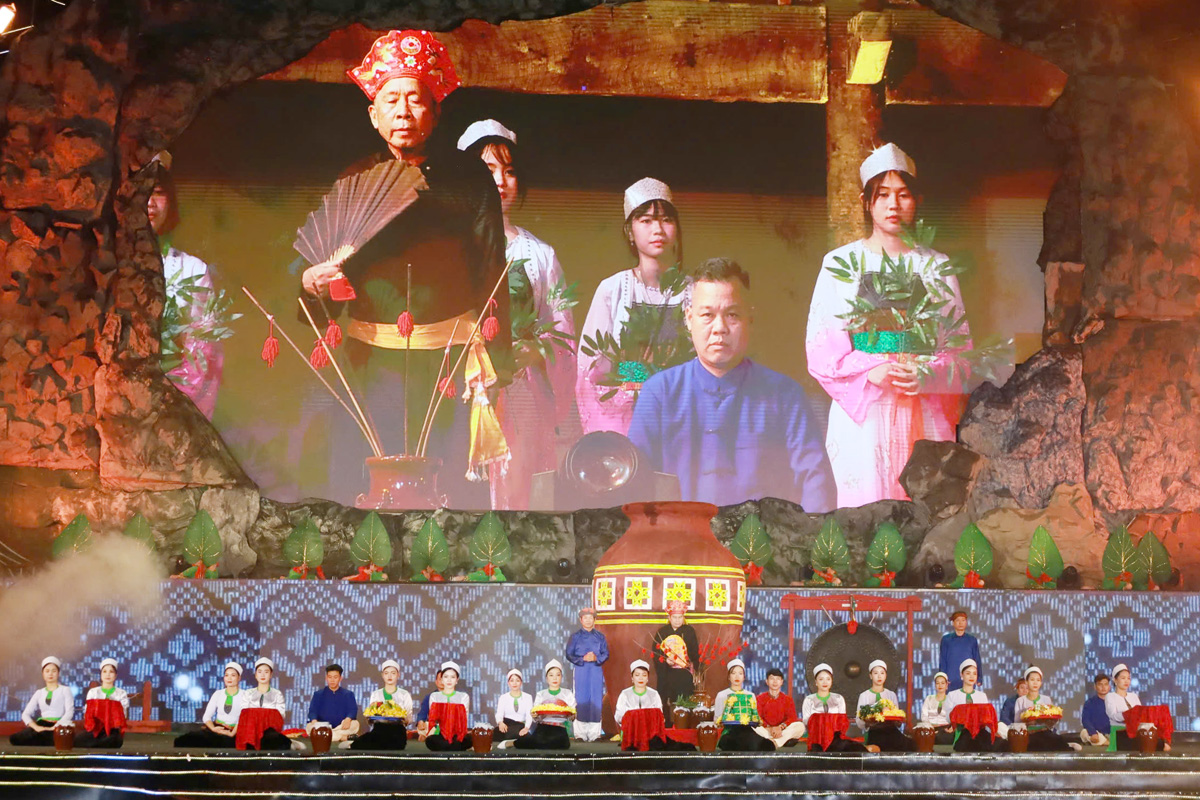
The vibrant "Ruou Can (a kind of wine stored in a big jar and drunk with long bamboo straws) Festive Night”, was held on November 18 as part of the Hoa Binh Province Culture- Tourism Week 2024, attracting a large number of locals and visitors.
A performance at the event.
Distinguished guests included former Party Central Committee member and former Secretary of the Provincial Party Committee Bui Van Tinh, along with other provincial leaders, event organisers, and representatives from various departments and localities.
This was the first time Hoa Binh province hosted such an event, highlighting it as an unique feature of the week-long cultural and tourism celebration. Opening with a ceremonial drum performance and the song-and-dance piece "Muong Ta Mo Hoi” (Muong people hold festival), the programme brought attendees back to the roots of Hoa Binh’s rich cultural heritage. The performance featured artisans and artists from the four Muong regions —Muong Bi, Muong Vang, Muong Thang, and Muong Dong— alongside representatives of the Muong, Thai, Tay, Mong, Dao, and Kinh ethnic groups.
In her opening remarks, Quach Thi Kieu, Director of the Department of Culture, Sports, and Tourism, emphasised the significance of preserving and promoting the cultural heritage of Hoa Binh, particularly its traditional ruou can. Over the years, the unique cultural value of ruou can has gained recognition across Vietnam, becoming a symbolic "cultural ambassador” for the province, she said.
Last year, the Vietnam Culinary Culture Association honoured Hoa Binh’s ruou can as one of the country's 121 typical foods and beverages. The official reaffirmed the province’s commitment to showcasing this cultural treasure to both domestic and international audiences through events like the "Night of Ruou Can."
The event served as a cultural space where artisans from the four Muong regions introduced the unique traditions surrounding ruou can, including its preparation and ceremonial drinking rituals. Rooted in harmony with nature, the tradition reflects a profound connection between people and their environment, as well as between individuals in the community.
The festivities included a reenactment of the legend of ruou can, featuring master artisans and shamans from the four Muong regions. Using natural ingredients such as herbal yeast and water from well, ruou can from Hoa Binh is known for its sweet, aromatic flavor, especially the varieties crafted in Muong Bi, Muong Vang, Muong Thang, and Muong Dong.
Attendees experienced the ceremonial offerings and invitation to drink ruou can. Five young women in traditional attire carried trays of offerings to the central stage, where the lead shaman performed the sacred invocation. With a fan in hand, he recited solemn prayers, inviting deities and ancestors to join the celebration and partake in the communal drink.
The festival atmosphere was enriched by the sounds of gongs, drums, and traditional folk music. Attendees enjoyed folk dances, music, and traditional games that showcased the optimism and resilience of the Muong people in both labour and their readiness to defend their homeland.
Mai Chau district has firmly established itself as a standout destination on Vietnam’s tourism map, attracting both domestic and international visitors with its breathtaking landscapes, rich ethnic culture, and warm hospitality. However, beyond its natural and cultural charm, a secure and well-managed tourism environment has added to Mai Chau’s appeal.
As Vietnam enters a new phase of economic and administrative reform in 2025, Hoa Binh province is stepping up its efforts to streamline governance, boost economic growth, and attract investment.
The Hoa Binh provincial People's Committee held its monthly meeting on March 26 to review the progress of key projects, assess budget revenue and public investment disbursement, provide feedback on draft documents for submission to the provincial Party Committee's Standing Board, and discuss other important matters related to the committee's governance activities.
Playing a key role in Hoa Binh province’s economic development, Luong Son district has been focusing on science and technology development, innovation, and digital transformation.
Identifying the application of online public services as a key step in administrative procedure reform and e-government building, Kim Boi district has proactively provided services and supported residents and businesses in accessing and utilising full-process online public services promptly and efficiently. The locality aims to lift the rate of end-to-end online public services to over 90%, with all officials and civil servants handling tasks in the digital environment.
Nguyen Anh Tuyet, hailing from a family steeped in the ancient art of herbal medicine, is transforming local medicinal herbs into high-value concentrated extracts, elevating their worth and healing potential.



